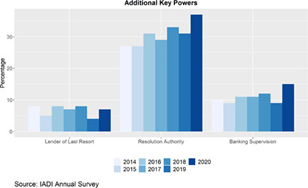Reporter: The Law on deposit insurance - the highest legal basis for deposit insurance activities in Vietnam has completed 10 years of implementation. How do you evaluate the results achieved in implementing the Law in recent years?
Dr. Nguyen Quoc Hung: Up to now, it has been more than 10 years that depositors have had their legal rights and interests protected since the Law on deposit insurance took effect (January 1, 2013). Although it is not officially responsible for paying depositors when banks fail or go bankrupt, DIV has reimbursed depositors at 39 People's Credit Funds that were affected and went to dissolve, bankruptcy. The legal rights and interests of depositors at these funds are guaranteed, creating confidence for depositors at PCFs in particular and credit institutions in general.
During the implementation of the Law, DIV has clearly demonstrated its role through remote supervision and examination of organizations participating in deposit insurance. During examination and supervision, if any violations are detected that affect the system safety, they are promptly reported to the State Bank of Vietnam (SBV) for timely correction. That has limited risks in the operations of organizations participating in deposit insurance, limiting the phenomenon of collapse and loss of liquidity at credit institutions.
In addition, DIV regularly communicates policies and laws on deposit insurance to enhance public trust and contribute to ensuring the safety of the system of credit institutions. Thanks to that, people can feel secure and trust in depositing money at organizations participating in deposit insurance. That helps the deposit insurance's financial resources grow steadily over the years, enough to respond promptly if it needs to pay depositors, support credit institutions in trouble, and be ready to perform other tasks that the Government and the SBV assigned to contribute to effective participation in the process of restructuring weak credit institutions.
Reporter: Besides the achievements, the Law on deposit insurance also revealed drawbacks in the process of implementation in practice. According to you, what problems do those dangerous include?
Dr. Nguyen Quoc Hung: Although quite impressive results have been achieved after 10 years of implementing the Law on deposit insurance, up to now, some inadequacies and limitations have been revealed, shown in the following points:
Firstly, the Law on deposit insurance has unclear regulations or has regulations that are not consistent with other laws such as: Regarding the time when the obligation to reimburse arises, how deposit insurance fees are waftd; about uninsured deposits; about investment channels; about the financial mechanism of the deposit insurance organization...
Secondly, the Law on deposit insurance has not been amended and supplemented in a timely manner compared to the Law on Credit Institutions in 2017, leading to some regulations in the Law on Credit Institutions being amended, but not in the Law on deposit insurance, leading to difficulties in participating in restructuring, supporting credit institutions to recover as well as the special control process.
Thirdly, related legal and policy mechanisms are not synchronized and inconsistent, causing limitations and difficulties for deposit insurance organization in protecting the legitimate rights and interests of depositors and participating more deeply in the process of supporting and restructuring weak credit institutions...
Reporter: The National Assembly and the Government have directed recently the State Bank of Vietnam regarding the need to soon amend the Law on deposit insurance for the period of 2022 - 2025 to enhance the role of DIV in restructuring the system of credit institutions. How is this expressed, sir?
Dr. Nguyen Quoc Hung: In my opinion, up to now, the discussion about amending the Law on deposit insurance is extremely necessary to better protect the interests of depositors, enhance the role of DIV and be consistent with reality. This is clearly shown in the guiding documents of the Government and the National Assembly such as:
In Decision No. 986/QD-TTg dated August 8, 2018 of the Prime Minister on approving the Vietnam Banking Industry Development Strategy to 2025, with a vision to 2030, amendments were mentioned. Then, Directive No.06/CT-TTg dated March 12, 2019, the Prime Minister directed to urgently study and propose amendments to the Law on deposit insurance to use deposit insurance premium to resolve weak credit institutions. In Decision No.1660/QD-TTg dated December 30, 2022 on approving the Deposit insurance development strategy to 2025, with orientations to 2030, the Prime Minister also requested to study and amend the Law on deposit insurance...In Resolution No. 62/2022/QH15, the National Assembly also requested to review and amend laws on credit institutions and the Law on Deposit Insurance.
Thus, the National Assembly and the Government have directed the SBV and DIV to urgently study and amend the Law on Credit institutions and the Law on the State Bank concurrently with the Law on deposit insurance , aiming to synchronize and unify the legal framework and enhance the role of the DIV in protecting depositors as well as being responsible for participating in restructuring and special control; In particular, for bankruptcy of organizations participating in deposit insurance.
Reporter: One of the new points of the draft revised Law on Credit Institutions is the renewal of the early intervention process for credit institutions, which adds the participation of DIV in this process. process. What does this mean, sir?
Dr. Nguyen Quoc Hung: I think that the amended Law on Credit Institutions mentions that it is necessary for DIV to participate in the early intervention process for credit institutions, both to take advantage of resources and demonstrate the roles and responsibilities of the DIV for depositors as well as organizations participating in the deposit insurance.
Reporter: In your opinion, is it necessary to amend the Law on deposit insurance soon, adding regulations on powers, responsibilities, and mechanisms to improve financial capacity so that the deposit insurance organization has enough resources when participating in early intervention? On the other hand, in what direction should the Law on deposit insurance be amended and supplemented to better protect the interests of depositors, as well as ensure the safe and healthy operation of the system of credit institutions, sir?
Dr. Nguyen Quoc Hung: In my opinion, to complete and synchronize with relevant laws, as well as enhance the role and responsibility of the deposit insurance organization, we must wait for the Law on Credit Institutions and the Law on the State Bank to be approved by the National Assembly. During this time, DIV should monitor and contribute fully and responsibly to the revised Law on Credit Institutions and the upcoming Law on State Bank of Vietnam to prepare the contents that need to amend the Law on Deposit Insurance to be consistent with the two laws mentioned above . Only then can we remove difficulties and obstacles in participating in restructuring, early intervention, examination, supervision... of organizations participating in deposit insurance as well as protecting the interests of depositors.
It is known that currently the Law on deposit insurance is not yet on the list of Law projects to be amended and supplemented in the 2023 and 2024 Law and Ordinance Development Program of the National Assembly . However, the expectation in the context of amending the Law on Credit Institutions is an urgent and important requirement to strengthen the foundation for credit institutions and ensure system safety; When this draft Law is approved by the National Assembly, it will create leverage for continuing to consider amending and supplementing the Law on deposit insurance to protect depositors and ensure the safety of the system of credit institutions more effectively. This is also an objective requirement to improve legal mechanisms and policies on deposit insurance to suit the development of the banking system, as well as absorb international experiences in the field of deposit insurance.
Reporter: Thank you very much!
Communication Department



























